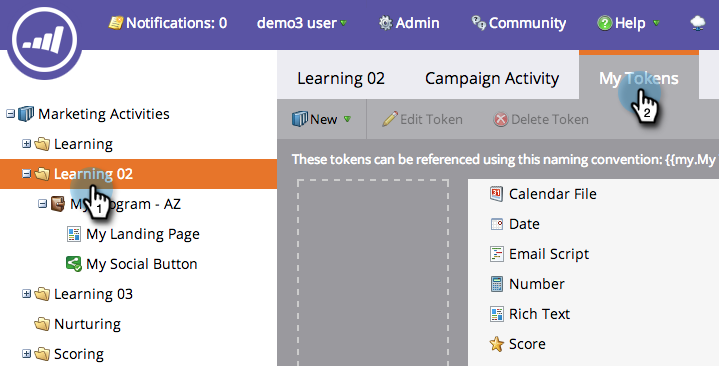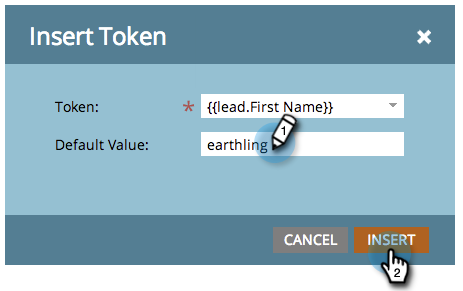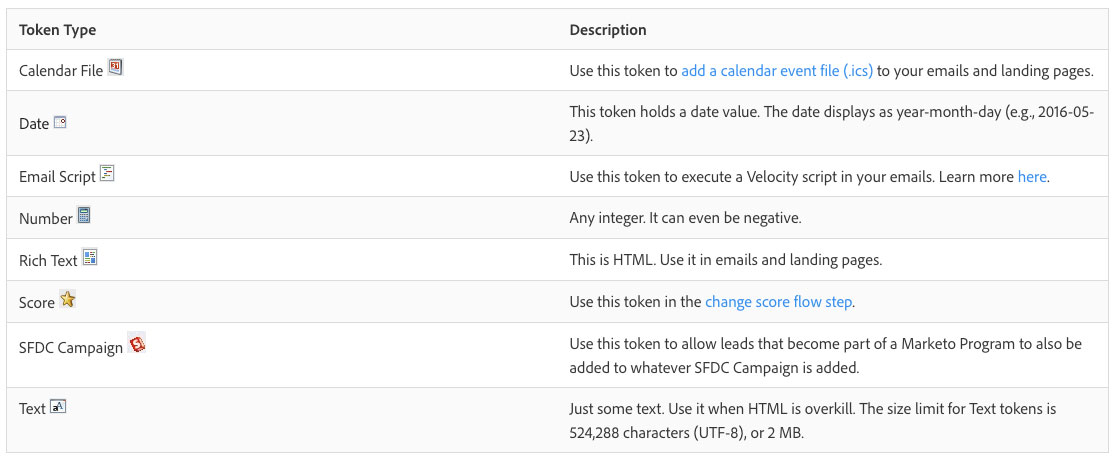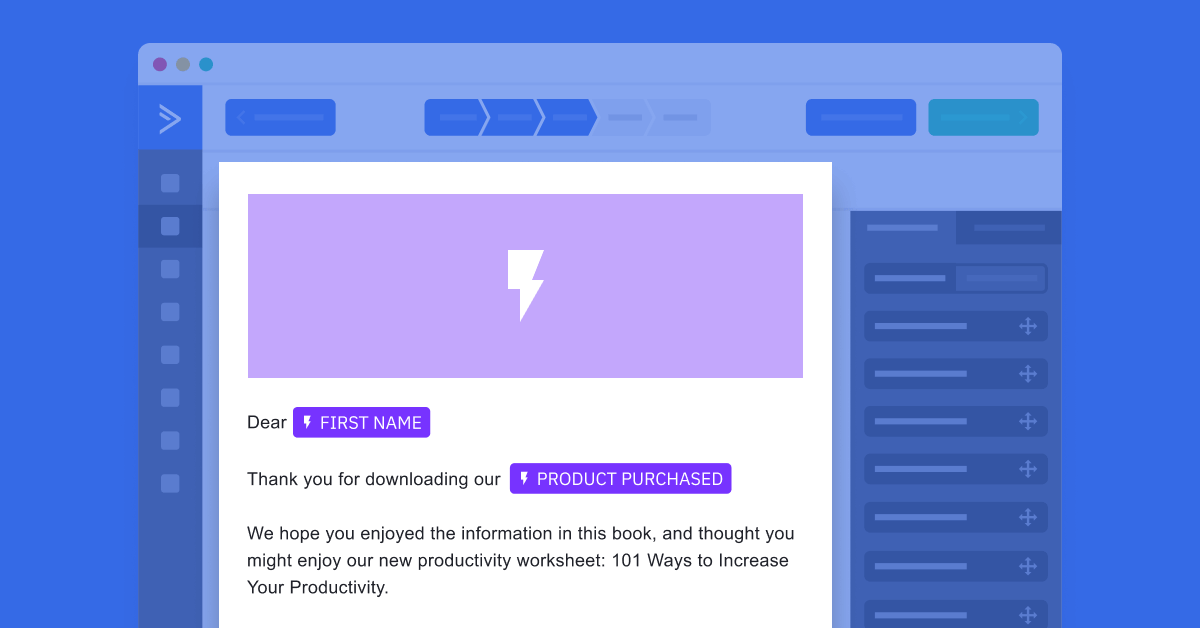Everything you need to know about Tokens in Marketo
Overview
Are you interested in learning how Marketo tokens can transform your marketing campaigns? Do you want to efficiently personalize and automate your content? This article dives into the details of Marketo tokens, exploring their types, use cases, and best practices to maximize their potential in your marketing strategies. Discover how these elements can help you enhance the consistency and scalability of your campaigns in today’s competitive marketing landscape.
- 1. What are Tokens in Marketo?
- 2. Uses of Tokens in Marketo
- 3. Types of Tokens in Marketo
- 4. Use Cases for Tokens in Marketo
- 5. Using Tokens for "Interesting Moments" and Tasks in Salesforce
- 6. Using Trigger Tokens
- 7. Velocity Script Tokens
- 8. Best Practices for Using Tokens in Marketo
- 9. Conclusion
What are Tokens in Marketo?
Tokens in Marketo are reusable variables that allow you to customize and automate content within marketing campaigns. They act as placeholders that get replaced with specific data at runtime, enabling personalization without repeated manual changes. This is particularly useful for maintaining consistency and efficiency in large marketing campaigns.
Uses of Tokens in Marketo
Tokens are primarily used for:
- Content Personalization: Inserting recipient-specific information, like their name or company, in emails and landing pages.
- Automation: Automatically updating data across multiple assets when database information changes.
- Scalability: Creating reusable templates and programs that can be applied to different campaigns.
- Consistency: Ensuring coherent information across all customer touchpoints.
Types of Tokens in Marketo
Marketo offers several types of tokens depending on context and need:
- Lead Field Tokens ({{lead.FieldName}}): Specific data about the lead, like name and email.
- Company Field Tokens ({{company.FieldName}}): Specific data about the company associated with the lead.
- System Tokens ({{system.FieldName}}): Marketo system information like current date and time.
- Program Tokens ({{my.TokenName}}): Customized for each program, useful for constant data within a program.
- Text Tokens ({{my.TextToken}}): Contain reusable text blocks.
- Date and Time Tokens ({{my.DateTimeToken}}): Used for specific dates and times.
- Number Tokens ({{my.NumberToken}}): Numerical values for calculations.
- Link Tokens ({{my.LinkToken}}): Store reusable URLs across multiple assets.
- Trigger Tokens ({{trigger.token}}): Capture real-time information when a triggering event occurs in Marketo.
Use Cases for Tokens in Marketo
- Email Personalization: Use lead field tokens to personalize greetings in mass emails.
- Example: “Hello {{lead.FirstName}}, thank you for your interest in our products!”
- Dynamic Landing Pages: Include company tokens to tailor content based on the visitor’s company.
- Example: “Welcome to our resources page for {{company.Industry}}.”
- Rewards Campaigns: Use program tokens to offer personalized discounts in various campaigns.
- Example: “Use code {{my.DiscountCode}} for a 10% discount on your next purchase.”
- Event Reminders: Send automated emails with date and time tokens to remind leads about upcoming events.
- Example: “Your appointment is scheduled for {{my.EventDate}} at {{my.EventTime}}.”
Using Tokens for "Interesting Moments" and Tasks in Salesforce
Interesting Moments
“Interesting Moments” are key events in the customer journey that can alert the sales team about important activities. Tokens personalize these events, making the information relevant and easy to understand.
- Use Case: Create an “Interesting Moment” when a lead downloads an ebook.
- Example: {{my.EbookName}} was downloaded on {{system.dateTime}}
Creating Tasks in Salesforce
Tokens can also be used to create tasks in Salesforce, automating the assignment and tracking of activities between sales and marketing teams.
- Use case: Create a task when a lead completes a contact form.
- Example: Subject: Follow-up with {{lead.FirstName}} {{lead.LastName}} Description: The lead has completed the contact form. Company: {{company.CompanyName}} Due Date: {{system.dateTime}}
Using Trigger Tokens
Trigger tokens capture real-time information about specific events that activate a Marketo campaign. These tokens are crucial for personalizing responses and actions based on customer-specific events.
- Examples of Trigger Tokens:
- {{trigger.Name}}: Name of the event that triggered the action.
- {{trigger.Date}}: Date and time of the event.
- {{trigger.WebPage}}: URL of the web page where the event occurred.
- {{trigger.QueryParameters}}: URL query parameters.
- {{trigger.Score}}: Score associated with the event.
- Use Case: Send a follow-up email when a lead visits a specific product page.
- Example: Hi {{lead.FirstName}}, We noticed you recently visited our page about {{trigger.WebPage}}. If you have any questions or need more information, feel free to contact us. Regards, Marketing Team
Velocity Script Tokens
Velocity Script Tokens Velocity is a template language used to create dynamic and personalized content in emails and landing pages in Marketo. Velocity script tokens allow calculations, data formatting, and conditional logic for further content customization.
- Examples of Velocity Scripts:
- Date Formatting:
velocity## Access Velocity's calendar object
#set($x = $date.calendar)
## Format date
#set($current_date = $date.format('dd-MM-yyyy', $x.getTime()))
## Returns today's date
$current_date
- Conditional Logic:
velocity#if($lead.Score > 50)
Congratulations, {{lead.FirstName}}! You are one of our most valued customers.
#else
Hi {{lead.FirstName}}, thank you for your interest. Keep interacting to gain more benefits!
#end- Field Concatenation:
velocity#set($fullName = "${lead.FirstName} ${lead.LastName}")
Hi $fullName, thank you for your interest in our products.
- Advanced Use Case: Dynamic Segmentation: Use Velocity scripts to segment content based on multiple lead criteria.
velocity
#if($lead.Industry == "Technology" && $lead.Score > 75)
Hi {{lead.FirstName}}, as a professional in the tech sector, we think you'll find our latest innovation report very interesting.
#elseif($lead.Industry == "Healthcare" && $lead.Score > 75)
Hi {{lead.FirstName}}, we have exclusive resources to help you improve management in the healthcare sector.
#else
Hi {{lead.FirstName}}, discover how our solutions can benefit your industry.
#end
Best Practices for Using Tokens in Marketo
- Clear Naming: Use descriptive and consistent names for easy management.
- Example: {{my.EventDate}} instead of {{my.Date1}}.
- Document Tokens: Keep a record of all tokens used and their purposes.
- Test Tokens: Always test tokens in campaigns and emails to ensure correct implementation.
- Regular Updates: Review and update tokens periodically to maintain information relevance.
- Limit Complex Tokens: Use simple tokens whenever possible to avoid errors and simplify maintenance.
Conclusion
Tokens in Marketo are essential tools for personalizing, automating, and scaling your marketing campaigns. By understanding the different types of tokens and how to use them effectively, you can significantly improve the efficiency and effectiveness of your marketing strategies. Follow best practices to ensure easy management and efficient maintenance, providing an optimal experience for both your marketing team and your leads and customers.
SIGN UP FOR OUR NEWSLETTER
Alejandro Torres
Marketing Automation Manager at Kapturall
Alejandro currently leads a team of Marketing Automation Consultants at Kapturall. His career in Digital Marketing began in 2019 at Mediaset España. Since then, his passion for the digital world has led him to explore various fields within digital marketing before joining Kapturall. In this company, he has stood out as a Marketing Automation Consultant, being certified as a 2X Expert in Marketo. His inclination towards team sports and cooperation projects is reflected in the methodology he applies to his projects, making them an excellent collaborative work.





